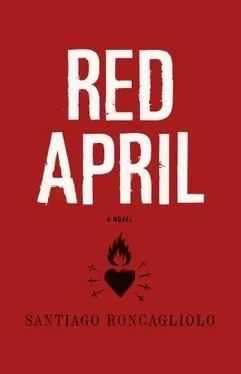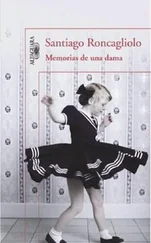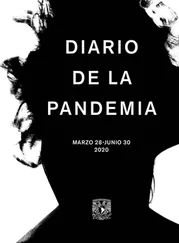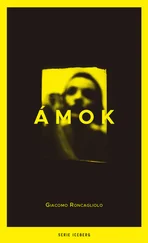Associate District Prosecutor Félix Chacaltana Saldívar became aware that he was considered an intellectual. In his way he had been in a war, as an unwilling witness, as the one who stays in the fortress of the capital until fire begins to bring down its walls and the smell of the dead contaminates the clean air. Suddenly, the commander stopped the jeep at a bend in the road and turned toward him:
“There wasn't one terrorist group here, or two. There was a war here, Señor Prosecutor. And in a war people die.”
The commander was becoming agitated. His voice, always so authoritative, seemed to break at certain syllables as he brought his face very close to Chacaltana's. Perhaps that was why he didn't say anything else. The prosecutor tried to calm him.
“I'm with you, Commander. I understand what happened. I saw it too, from the other side.”
The commander drew back his head. He took a deep breath. He no longer seemed furious. He seemed disoriented.
“The other side. Sooner or later they'll come from your side. Sooner or later they'll come from Lima, Chacaltana. They'll come for our heads. They'll sacrifice us, the ones who fought.”
The commander was sweating. The prosecutor offered him his handkerchief. The commander looked straight ahead. He seemed very concentrated. The prosecutor did not dare to move the handkerchief too close to him.
“It was them or us.”
The commander did not say anything else. Them or us, thought Chacaltana, until we are all the same, until there is no more distinction between us.
“I understand,” he said.
The commander started the motor again. He seemed to gradually evanesce as they returned to the highway.
“It's important that you understand,” he insisted, “because you still haven't seen anything.”
They continued on to Ayacucho, and then to the military hospital, where they got out. They climbed the steps and crossed the waiting room together. No one asked where they were going or tried to stop them. No one went to an office to find out if they could go through. They entered the corridor that Chacaltana remembered very well from his last visit, passing several wounded people who did not approach them to ask for help. They had not walked very far before the prosecutor realized they were going to the obstetrics ward, to the closed office surrounded by women in labor. He thought of his mother as the cold illumination revealed the criminal pathologist.
“Please close the door quickly.”
From the door, the dandruff on his shoulders was not noticeable. Only when they were at the autopsy table did the prosecutor notice that the pathologist seemed dirtier than last time. The smell was different too. This time it was clearly the smell of a corpse. Not too decayed yet, but already penetrating. Several cigarette butts and a few matches had accumulated under the table. This time there were no chocolate wrappers.
“Señor Prosecutor, I see you're not alone.”
“Hello, Posadas.”
This time nobody spoke about any paper. The commander's greeting was a gesture. The pathologist gave them two surgical masks smeared with Vicks VapoRub.
“You're going to need them,” he said.
Then he stood and walked to the table covered with a cloth. The prosecutor brought his handkerchief to his mouth in anticipation of what lay underneath. The light flickered. No one had fixed it since the last time. No one would ever fix it. The pathologist uncovered the table. This time the body was not as decomposed as the last time. It was a recent corpse, unburned, the body still bruised by the onset of rigor.
“Completely drained of blood,” Posadas remarked. “Observe the shoulder.”
The chest was an enormous red vulva with several sharp metal protuberances pointing at the ceiling. On the left side a mass of bones, muscles, and arteries erupted. What did not erupt was an arm.
“The first time it was the right arm, now they've cut off the left. It seems these gentlemen want to make a puppet.”
The commander came close to the face. It was a face stretched into a final shout, with open eyes trying to escape their sockets. He closed the dead man's eyes. Only then, safe from the pressure of those eyes on his, could the prosecutor recognize Justino Mayta Carazo.
“They just brought him in,” said the officer. “He was found at dawn, right after the news about the mass grave.”
At that moment the prosecutor did not remember fire but he did remember blows, blows on the chest, one after another, like the dripping from the table, blows on the door at dawn, in a house without light.
“It is clear to us there are several of them,” said the prosecutor. “Or at least two well-trained men. The things they have done in both cases cannot be done individually.”
“Digging up graves can't be done alone either,” added the officer.
The prosecutor asked for a glass of water. The physician took a bottle out of a refrigerator for specimens. The prosecutor decided not to drink that water. The physician handed it to him, saying:
“They're also trained. At least the one with the knife is. These are surgeries. He was stabbed seven times in the heart, with perfect precision. With all kinds of things: machetes, scouting knives, even a butcher knife. They had a good collection, apparently. They destroyed the heart without cutting the principal arteries and deliberately left the body facedown. Almost all the blood came out of his chest, the pulverized heart still managed to pump for a few minutes after death. He was being extinguished. It was slow, but to accelerate exsanguination they cut off his arm. It seems to be the same method as the previous time. It was removed by the roots.”
“A two-handed saw, probably,” said the commander. “Two people, you cut through the bone as if it were a piece of wood. You only need a little patience. What are those lacerations all over the body?”
“Beak marks,” the physician explained. “They left the body where we found it, on Acuchimay Hill, for the buzzards to eat.”
The prosecutor felt he ought to make a contribution to the discussion but was afraid that if he opened his mouth something would escape, tears, retching, inappropriate words. A puppet. A puppet constructed with human parts, a Frankenstein monster made of Ayacuchans. He tried to maintain a professional tone.
“Was … was there any recovery … of a Senderista … nature near the deceased?”
The pathologist seemed surprised by the question. His face reflected relief and at the same time terror. He turned toward the officer, who took a paper from his pocket and unfolded it. The prosecutor thought about suggesting more attentive care of evidence but preferred to concentrate on the note. He read:
KILLED BY THE PEOPLE'S JUSTICE
for rustling
Sendero Luminoso
They are back, thought the prosecutor.
The commander said:
“When all is said and done … you may have hit the nail on the head with your idea about the terrorists, Señor Prosecutor.”
“Nail” was an unfortunate word. The prosecutor tried to focus his gaze on some less horrific part of the body. He stared at the feet splayed from walking through the countryside, the thick nails, green now.
Dr. Posadas lit a cigarette.
The second time the prosecutor entered army headquarters, he did not have to present any identification. With Commander Carrión, he crossed the central courtyard of the old building and climbed a wooden staircase to the second floor. There, at the end of a creaking wooden corridor, was the commander's office. Inside, the air seemed heavier than it had the first time. It made him think of the air in Lima, downtown, on Avenida Tacna at six in the evening. The commander poured two glasses of pisco . The prosecutor did not want to refuse. They sat facing each other, this time at the worktable. Sitting there, they were on the same level. The commander took the first drink.
Читать дальше












